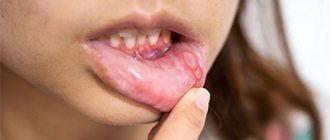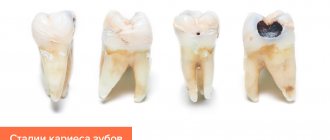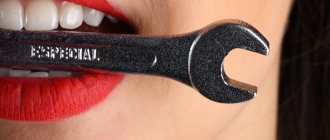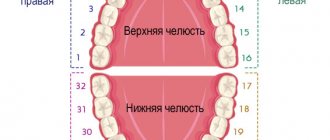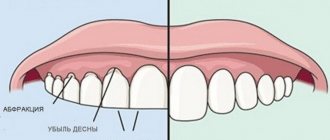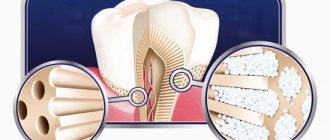Bleeding gums in children and adults is a fairly common phenomenon. Someone will say that this is a small thing - bleeding from the gums. But this is not true; bleeding may be a sign of a serious oral disease or infectious pathology. If this is not the first time you have seen blood when brushing your or your child’s teeth, you should contact your dentist.
By the way, many girls and women’s gums begin to bleed during pregnancy. The main reason, as a rule, is hormonal changes in the body. 2-3 months after giving birth, the situation will change for the better, you will no longer feel the unpleasant taste of blood in your mouth.
Why do my gums bleed?
Bleeding from the gums can occur for mechanical or pathological reasons.
The first group includes a blow to the jaw area or minor injuries due to an incorrectly selected crown or filling. In this case, bleeding goes away immediately after the problem is eliminated. Only a doctor can assess whether a crown has been chosen correctly or a filling has been installed during a face-to-face consultation, because it is difficult to see such nuances on your own. Gums can also be damaged by a brush that is too hard, intensive use of dental floss, or careless impact with other objects in an attempt to completely remove food debris. In this case, bleeding appears only after the procedure and disappears after a few minutes.
Pathological causes are associated with diseases of the oral cavity and other organs. Bleeding is a symptom:
- gingivitis - inflammation of the gums;
- stomatitis - ulcers on the oral mucosa;
- periodontitis - inflammation of the soft tissues around the tooth (localized - in several units, or generalized with damage to the entire jaw);
- leukemia (leukemia) - blood cancer with a characteristic decrease in immunity;
- intoxication with heavy metals (lead, mercury);
- diabetes mellitus, which causes weakness of the gums and blood vessels due to characteristic angiopathy.
Often gums bleed due to hormonal changes. It can be caused by pregnancy, menstrual irregularities, and puberty.
When your gums bleed when brushing your teeth
Most patients' gums do not bleed constantly. Symptoms only appear when brushing your teeth or eating hard foods. This occurs for several reasons:
- inflammation of the gums makes them more vulnerable to injury;
- the process of desquamation of the epithelium of the oral mucosa intensifies, which thins the tissue;
- capillaries located close to the gums become more permeable and bleeding occurs more easily.
The combination of all three factors leads to the fact that when brushing your teeth, your gums begin to bleed. This symptom should not be ignored. Cure the disease at an early stage is much faster and cheaper than in an advanced form. And the appearance of blood when brushing your teeth is not considered normal; it is always a sign of pathology.
Predisposing factors
Bleeding gums can be caused by injury or disease. But there are a number of factors that make the risk of this symptom appearing higher.
Gums bleed in patients:
- with chronic inflammatory diseases of the oral cavity;
- with xerostomia - dry mouth;
- with reduced immunity, including HIV and AIDS;
- with vitamin deficiency, especially C and K;
- with mouth breathing;
- with poor or irregular oral hygiene.
These factors cannot be called the cause, but they contribute to the development of bleeding gums. Those for whom none of the points apply have a much greater chance of not learning about such a problem.
If your gums bleed in the morning or at night
Peak bleeding at night or in the morning indicates an unsuitable toothbrush. During brushing, the gums are injured. In this case, you need to visit the dentist and take a hygiene lesson with the selection of personal hygiene products.
Bleeding gums may not be normal. It is definitely worth finding out the cause and treating it before the disease reaches a chronic stage.
Folk remedies
They are sometimes included in the overall treatment strategy, and sometimes used as a temporary measure before going to the dentist.
If your gums bleed, the following folk remedies are usually used:
- Oak bark decoction. They rinse the mouth with it several times a day, as it strengthens the gums and helps eliminate the inflammatory process. The preparation is simple - you need to brew 1 tbsp. l. crushed oak bark in 1 glass of water. The product should be allowed to brew until it cools, decant, and then you can use it;
- Camomile tea. This plant is an effective antiseptic with healing and anti-inflammatory effects. Pour 1 tsp into a glass of boiling water. plants, after which the infusion should be left to cool. Next, it is expressed and used to rinse the mouth. The procedure must be performed several times/day;
- Sage tea. The plant is an excellent antiseptic that has a healing, anti-inflammatory effect. It is brewed at the rate of 1 tsp. for 1 cup boiling water. Cooled to room temperature and strained, the infusion is used for rinsing;
- Water pepper infusion. This is something you can rinse your mouth with to reduce bleeding. The plant helps strengthen the walls of blood vessels, thereby normalizing blood clotting processes. To prepare the product, add 1 tsp. raw materials 1 cup boiling water, let it brew. It is then expressed and used as a mouthwash;
- Horseradish or black radish juice. It must be freshly squeezed, and its properties are that it helps eliminate plaque and tartar. You need to mix 2 tsp. juice of one of the vegetables with wine (200 ml). You can not only rinse your mouth with it, but also use it as an immunomodulator, taking it orally in small portions.
Traditional medicine suggests using sauerkraut and freshly squeezed carrot juice as ways to combat the problem. Please note that the methods listed above only help eliminate the symptom, but do not help cope with the cause of its occurrence. Therefore, visit your dentist, and only with his permission, use or discard them.
Bad breath due to bleeding gums
Bleeding from the gums is often accompanied by bad breath. There are several reasons for this:
- proliferation of bacteria against the background of inflammation;
- accumulation of soft and hard dental plaque;
- the presence of deposits under the gum that are not visible to the naked eye.
An unpleasant odor is a formidable symptom, since it does not appear immediately. This means the disease is already progressing. It is impossible to find out the cause and eliminate it on your own (without a dentist); The pathology will become chronic and it will be more difficult to cure.
A lump with pus on the gum against the background of bleeding
The appearance of a tumor on the gum can frighten anyone. The presence of a round swelling against the background of bleeding gums indicates one of the diseases:
- periodontitis - destruction of the soft tissue around the tooth with the formation of a characteristic lump;
- periodontitis - the presence of a capsule with pus on the gum due to destruction of the tooth root;
- intragingival fistula - a lump with pus inside, the contents of which, when ruptured, come out, significantly facilitating the patient’s well-being;
- periostitis (flux) - a red spherical formation on the gum, the appearance of which is accompanied by swelling of the cheeks and enlargement of the nearest lymph nodes;
- epulis is a neoplasm that does not contain pus, resulting from mechanical damage to the soft tissues of the oral cavity;
- Gingivitis is a painless lump on the gum.
Most of these conditions require urgent medical attention. If pus gets into the bloodstream or into the internal tissues of the tooth, it not only leads to severe pain, but also poses a fatal danger. If a lump appears on your gum, you should immediately go to see a dental surgeon. He will determine the cause of its formation and select treatment.
Vitamins
Injections, where the active ingredient is vitamin C, are a common prescription by the dentist for inflammation of the gum tissue, which manifests itself against the background of vitamin deficiency. This vitamin is well absorbed, reduces bleeding and helps strengthen gum tissue. In addition, these injections for bleeding gums have a positive effect on the condition of the entire body. To avoid vitamin deficiency and related problems in the oral cavity, it is recommended to take special vitamin complexes twice a year. Ascorutin also plays a role in the treatment of bleeding gums.
Gums bleed in pregnant women
While carrying a child, a woman’s body undergoes restructuring: special hormones begin to be produced, and the body changes. This also applies to the oral cavity. Every second pregnant woman is diagnosed with hypertrophic gingivitis. It is manifested by an increase in gingival papillae and the appearance of bleeding.
The cause of this condition in a pregnant woman can also be the accumulation of bacteria due to an increase in the depth of the gum pockets. Bacteria accumulate in them, causing inflammation. Proper brushing helps to avoid the development of bleeding gums. It is better to use an irrigator and mouth rinses for this.
Signs of gum problems
Bleeding is often one of the first symptoms to appear. But over time, if this phenomenon is left unattended, the following signs may appear:
- Unpleasant odor from the mouth;
- The appearance of a taste of blood in it, especially when eating or brushing teeth;
- Redness, which may also affect the soft tissues of the oral cavity;
- Increased sensitivity of teeth, in which they react to cold, hot, sour, sweet, salty;
- The appearance of pain;
- As the disease that provokes the problem progresses, the necks of the teeth often open later and pockets form in which deposits and infections accumulate.
If your gums bleed, the cause is not eliminated for a long period, and other symptoms may also appear. They usually consist of receding gums, discharge of pus from them, and itching.
Children's gums bleed
Young children enjoy brushing their teeth the least. If parents do not control the quality of oral hygiene, gingivitis occurs. In this case, the main symptom of the disease is bleeding gums.
The physiological cause of this condition in children is the process of teething. In this case, the integrity of the gum is compromised and it can bleed.
Problems with the gums are also caused by an incorrect bite. In this case, soft tissues are injured by teeth that are incorrectly positioned relative to each other.
Wearing orthodontic appliances can damage the integrity of the gums. This especially happens when wearing braces with uneven edges. To prevent injury, locks must be treated with special wax. But children often forget to do this; as a result, braces damage soft tissues, causing bleeding.
“Disease of dirty hands” - stomatitis, also more often affects children. They take less care of hygiene, which provokes the appearance of characteristic ulcers on the mucous membrane.
Some parents believe that children do not need to treat their baby teeth, because they will still be replaced by molars. This opinion is erroneous, because caries is caused by bacteria, and their constant presence in the mouth leads to periodontitis. The disease is characterized not only by bleeding gums, but also by the appearance of bumps with pus. This condition requires immediate medical intervention, otherwise serious complications arise.
How to stop bleeding
Of course, it is best to prevent bleeding, that is, not to subject the gums to mechanical damage, not to provoke the development of inflammatory diseases, and to systematically brush your teeth. But if the problem has already arisen, the following methods will help stop it:
- attach a tea bag;
- apply a cotton swab soaked in hydrogen peroxide;
- anoint the gums with a special gel.
If the bleeding is not severe, you can use a tea bag. A wet tea bag (green tea is best) should be applied to the damaged and bleeding gum. Tea leaves contain tannic acid, which promotes blood clotting. If you hold the tea bag for 5-10 minutes, the blood will stop flowing, and the wound will quickly heal and heal.
An ordinary pharmacy 3% solution of hydrogen peroxide will also help stop the bleeding. Apply a cotton swab soaked in hydrogen peroxide to the bleeding wound on the gum and hold there for several minutes. Hydrogen peroxide will quickly stop bleeding, and will also serve as an excellent cleanser and disinfectant that will prevent the wound from becoming infected and causing inflammation.
Medicines in the form of a gel will also help to cope with bleeding - for example, Dental, Solcoseryl, Metrogyl Denta and others. The gel-like form allows the drug to envelop the gums with a protective film, which not only quickly stops bleeding, but also has anti-inflammatory and antibactericidal properties.
Which doctor will help if my gums are bleeding?
If you have bleeding gums, you should consult a dentist. In the absence of complications, the doctor’s specialization does not play a role.
If the condition is complicated by the appearance of a lump with pus, you should immediately go to a dental surgeon. He will determine the type of tumor, choose treatment tactics and, if necessary, perform urgent surgery. At the Matisse Dent clinic, you don’t need to make an appointment several weeks in advance, endure pain and wait for help. With an acute condition, doctors will accept and perform surgery on the day of treatment.
SOS remedies against bleeding gums
Sometimes it’s impossible to get to the doctor and you need to wait 1-2 days until the appointment. In this case, several SOS tools will help.
- Rinses: chlorhexidine, oak bark decoction, LACALUT Aktiv rinses with aluminum lactate and sodium fluoride, PRESIDENT Antibacterial with plant extracts - relieve inflammation, prevent bleeding.
- Gels: Cholisal, Parodontocid - reduce pain, remove signs of inflammation.
- Pastes: Forest balm - contains oak bark, stops bleeding, strengthens gums.
All means must be used comprehensively. First, brush your teeth, then rinse (1 minute). After this, the solution is spat out and the gums are dried with gauze: this way the gel is better fixed. Then use ointments, applying with your finger to the entire inflamed surface. If saliva comes out during treatment, you should not swallow it, you need to spit it out.
After the procedure, you should refrain from drinking for 30 minutes and from eating for 2 hours. Treatment is carried out twice a day: after breakfast and at night.
The most effective remedy for diseases in which the gums begin to bleed is antibiotics. They help to quickly relieve inflammation and improve well-being. But they are available with a prescription and are taken only as prescribed by a doctor. Therefore, you won’t be able to buy and prescribe antibiotics yourself. It is better to immediately make an appointment with a specialist so as not to waste time and money on something that will not solve the problem, but will only delay the inevitable.
Toothpastes to protect gum health
Paste for bleeding gums is perhaps the most popular remedy. Often people do not attach much importance to the choice of toothpaste and take either the first one they come across, or the advertised one, or the one that is cheaper. However, it is necessary to select toothpaste taking into account not these factors, but taking into account the individual characteristics of each individual person.
For bleeding gums, their hypersensitivity and inflammation, a paste containing fluoride and extracts of medicinal plants will help. Herbs have healing properties, and fluoride helps protect and strengthen teeth, preventing the development of pathologies. If the gum tissue is bleeding, it is not allowed to use whitening pastes, as they contain components that irritate the mucous membranes and contribute to the development of inflammation.
The best toothpaste for bleeding gums is one of these:
- Parodontax Classic;
- Blend-a-Med pro-expert;
- Splat;
- Forest balm;
- Lacalut aktiv;
- ElmexAronal;
- PresiDENT.
These products are designed specifically to eliminate diseases in the oral cavity, and they also provide a preventive effect.
We recommend that you learn about the symptoms of periodontitis here -
Mistakes in self-medication
When trying to get rid of bleeding gums on their own, patients make a number of mistakes. Never worth it:
- start taking antibiotics without a prescription - they may not be needed, but the blow to the body will be dealt;
- Stop brushing your teeth - this will only lead to a worsening of the condition;
- getting too carried away with oral hygiene - this will not save you from complications and will not cure, but will only aggravate the situation due to systematic injury to soft tissues;
- be afraid to go to the dentist - modern treatment methods are painless and do not cause discomfort, unlike purulent complications.
Lack of timely and competent treatment of bleeding gums leads to the spread of inflammation to bone formations. As a result, teeth become loose and fall out, requiring implants to be inserted. This is much more expensive than contacting a specialist in time to solve a gum problem.
You should not let the disease progress and self-medicate; come to the Matisse Dent clinic and receive competent medical care.
Prevention
Most often, bleeding gums can be avoided by following fairly simple to follow recommendations, which you can find below:
- Use a soft toothbrush, do not injure your gums while brushing.
- Get rid of bad habits, reduce your coffee consumption.
- Balanced diet and vitamin intake. Eat raw vegetables and fruits, they help get rid of plaque and are rich in vitamins.
- Regular oral hygiene. Use dental floss and mouthwash after every meal. Brush your teeth 2 times a day. Get examined by a dentist at least 2 times a year, unless there are any pathologies.
- Select your toothpaste together with your dentist. There are a large number of pastes with a therapeutic, healing effect. And do not use one paste for more than 4 months.
